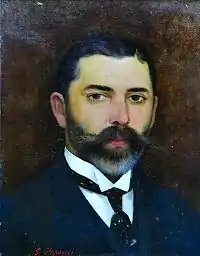Gheorghe Popovici
Gheorghe Popovici (5 October 1859, Iași - 24 February 1933, Iași) was a Romanian painter and designer in the Academic style.

Biography
He spent his childhood in Hotin. Later, he attended the secondary schools in Iași, graduating from the "Școala de Arte Frumoase" (School of Fine Arts) in 1883.[1] His talents earned him a state scholarship to study in Rome, then Paris, where he worked with Léon Bonnat, absorbing cultural influences as well as artistic techniques. In 1900, he won critical acclaim at the Exposition Universelle for his depiction of Horea's execution.[2]
After returning home, he was appointed Professor of painting and composition at his old alma mater, the School of Fine Arts. From 1911 to 1929, he served as Director.[3] During his thirty years as a teacher, his students included Nicolae Tonitza, Ștefan Dimitrescu, Camil Ressu and Aurel Băeșu.[3]
For a time, he was also Director of the school's library, which later became an art museum. During World War I, when the second shipment of the Romanian Treasure was being put together for transport to Moscow, he used the library to hide well-known art works from the local area, and they became the basis for the museum.[4]
Overall, he preferred large oil paintings and created murals for the "Metropolitan Palace", depicting the Nicene Council and the Synod of Iași.[1]
Selected paintings
 Peasant Woman in Spring
Peasant Woman in Spring Gypsy
Gypsy Winter
Winter View of the Bridge Over the Moldova River
View of the Bridge Over the Moldova River
References
- "Pictorul Gheorghe Popovici" @ Evenimentul.
- "Gheorghe Popovici, un maestru expus foarte rar" @ Cronica Românǎ.
- "Gheorghe Popovici - Pictor" @ Evenimentul.
- "In Memoriam Pictorul Gheorghe Popovici" @ Evenimentul.
Further reading
- Maria Paradaiser: Gheorghe Popovici - expoziție retrospectivă organizată cu prilejul împlinirii a 110 ani de la nașterea artistului; 1859-1933 (exhibition catalog), Intreprind poligrafică 1969 http://www.worldcat.org/title/gheorghe-popovici-1859-1933-expozitie-retrospectiva-organizata-cu-prilejul-implinirii-a-110-ani-de-la-nasterea-artistului/oclc/895273849
![]() Media related to Gheorghe Popovici at Wikimedia Commons
Media related to Gheorghe Popovici at Wikimedia Commons